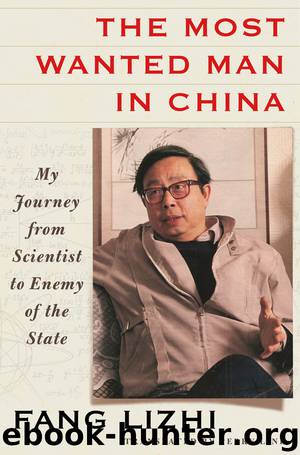The Most Wanted Man in China by Fang Lizhi

Author:Fang Lizhi
Language: eng
Format: epub
ISBN: 9781627795005
Publisher: Henry Holt and Co.
12. TURN TOWARD ASTROPHYSICS
My work at the brick factory came to an end less than a month after I got back from Huangshan. The authorities reassigned me to the physics department. The decision arrived abruptly and for a reason I hardly expected. It was not that they suddenly concluded that I no longer needed reform, and it was not that the brick factory suddenly closed. It was that Lin Biao suddenly changed from Mao Zedong’s “closest comrade in arms” to “traitor” and died.
In China’s planned economy, everything was supposed to go according to a central plan. The reality for citizens, though, was very nearly the opposite. To plan one’s life could be treacherous, because the core of the Party, while planning what would happen to everybody else, could not plan itself. Interminable struggles over the political “line” at the highest levels, and unpredictable risings and fallings of top leaders, happened quite outside any plan. The government regularly issued five-year plans for the economy, but never published a five-year plan for the intra-Party struggles over the political line, even though, for ordinary people, the consequences of the latter were far greater than those of the former. This proves that life in China’s socialist system obeyed one of the fundamental tenets of Marxist “dialectics”: it showed that A arises from a lack of A—a plan arises from the lack of a plan.
On September 13, 1971, Lin Biao met with his unplanned death according to plan. (Exactly what plan led to the death has been a topic for lively debate among historians ever since.) After that, the Great Cultural Revolution entered its second half, which was a stage of decline. Slogans about revolutionary struggle still rent the heavens, but to judge from the exhausted look in Mao’s eyes (apparent in photographs), the campaign was on the wane. Soon the “Mao Zedong Thought Propaganda Teams,” whose job it had been to stir up class struggle, left the campuses, and after that the “proletarian dictatorship brigades” (of which our brick factory group was one) were disbanded as well.
A “new” revolution arrived, however. Its formal name was the Proletarian Education Revolution, and its slogan was “Return to class to make revolution.” My recall to the physics department happened under its aegis.
The new revolution turned out to be just another rubric for class struggle, and I was once again sent to do factory work. But although the reality was the same, the theory this time was different. Officially, the purpose was not to “reeducate” people or to “reform” them. It was to illustrate another of Marx’s principles: that everything is created by labor. Engels had said that all of the natural sciences arise from needs that emerge in the course of productive labor. For science, one factory is more important than twenty universities. Conversely, anything that is not necessary to the processes of productive labor is for that reason not science, or at least not proletarian science. It followed that the first step in an education revolution in the natural sciences should be that scientists participate in productive labor.
Download
This site does not store any files on its server. We only index and link to content provided by other sites. Please contact the content providers to delete copyright contents if any and email us, we'll remove relevant links or contents immediately.
| Arms Control | Diplomacy |
| Security | Trades & Tariffs |
| Treaties | African |
| Asian | Australian & Oceanian |
| Canadian | Caribbean & Latin American |
| European | Middle Eastern |
| Russian & Former Soviet Union |
The Secret History by Donna Tartt(16658)
The Social Justice Warrior Handbook by Lisa De Pasquale(11494)
Thirteen Reasons Why by Jay Asher(7801)
This Is How You Lose Her by Junot Diaz(5799)
Weapons of Math Destruction by Cathy O'Neil(5046)
Zero to One by Peter Thiel(4834)
The Myth of the Strong Leader by Archie Brown(4795)
Promise Me, Dad by Joe Biden(4455)
Beartown by Fredrik Backman(4433)
Stone's Rules by Roger Stone(4422)
How Democracies Die by Steven Levitsky & Daniel Ziblatt(4413)
The Fire Next Time by James Baldwin(4350)
100 Deadly Skills by Clint Emerson(4085)
A Higher Loyalty: Truth, Lies, and Leadership by James Comey(4039)
Rise and Kill First by Ronen Bergman(4020)
The David Icke Guide to the Global Conspiracy (and how to end it) by David Icke(3891)
The Farm by Tom Rob Smith(3878)
Secrecy World by Jake Bernstein(3788)
The Doomsday Machine by Daniel Ellsberg(3737)
